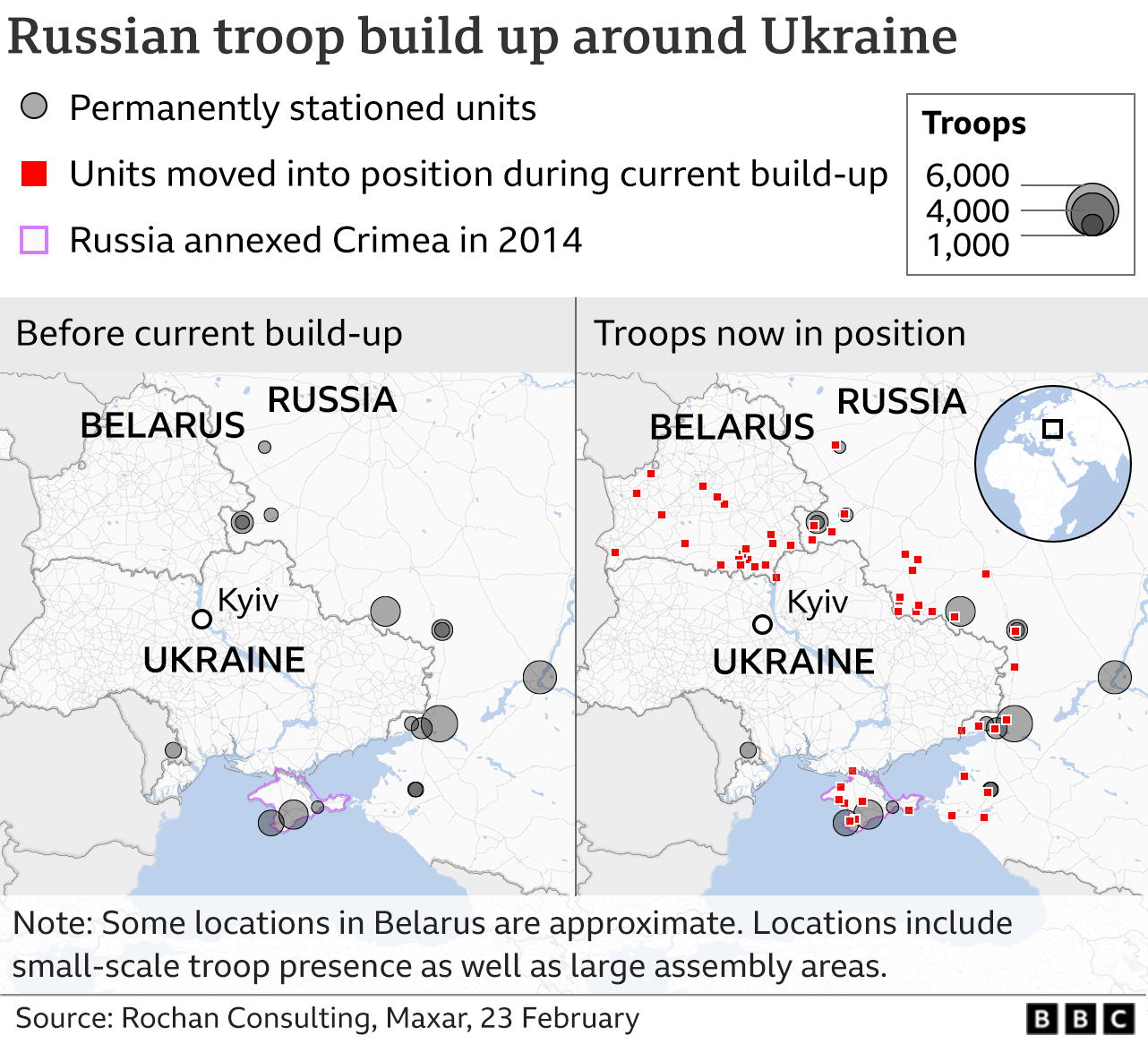“Always make the audience suffer as much as possible.”
Alfred Hitchcock
It feels as if Vladimir Putin has been watching a lot of Hitchcock.
For months the Russian leader has been keeping the world guessing. Will he or won’t he launch a full-scale invasion of Ukraine? Is he or is he not planning to demolish the post-Cold War security order in Europe?
His decision to recognize the independence of two breakaway republics in eastern Ukraine took many by surprise.
But what will President Putin’s next move be?
“Suspense is Putin’s favorite tool,” says Lilia Shevtsova, author of the book Putin’s Russia.
“He will maintain the tension, turning the fire on and off.

He won’t probably attempt a full invasion. But he has a variety of possible actions available to him, such as cyber-attacks and squeezing Ukraine economically like a boa constrictor. A Russian military incursion to seize the whole of Donetsk and Luhansk regions is also possible. He will be like a cat playing with mice.
Fathoming what’s going on behind the Kremlin walls is difficult enough. Reading Putin’s mind is more challenging still.
“He will go by stages. First, he recognized the [separatist] regions. Then he will put troops in. Next, those regions might announce a referendum on joining Russia according to the Crimea scenario. Then, maybe, there will be a local military operation to extend their territory up to their pre-2014 boundaries.

“If he’s allowed to play the game by his rules, he will do this for as long as possible. He will cook the meat on a slow fire.”
Western leaders are hoping that a new round of sanctions against Moscow will be a game-changer. But Russia is talking tough.

“We think these sanctions are illegal,” Maria Zakharova, a spokeswoman for the Russian Foreign Ministry, told me.
“We understood long ago that this is the only tool the West can use against us, to contain our development… we knew that there would be sanctions no matter what. It doesn’t matter what we’d have done or how we’d have behaved. Sanctions were inevitable.”
“But does Russia not care that its international reputation, in the West, is getting lower and lower?” I asked. “Your country is seen increasingly as an aggressor.”
“You’re inventing this reputation,” Ms. Zakharova replied. “What do you think of the West’s reputation? It’s covered in blood.”
The EU has reportedly included Ms. Zakharova on its new sanctions list.
A Hitchcock thriller entertains. But Putin’s Ukraine thriller is making the Russian public nervous.
“Most people don’t want to know what going on there,” says Denis Volkov of the Levada public opinion agency.
“It’s too frightening for them. They don’t want to listen. People are scared of a war: around half of the people we survey think war is a possibility.”
Few Russians publicly oppose the government line. But some leading Russian intellectuals have signed a petition to avoid an “immoral, irresponsible and criminal” war in Ukraine. They claim that “Russians have become hostages to criminal adventurism”.
“In Russia, we have no possibility to influence our government or our parliament,” explains Professor Andrei Zubov, who has added his name to the petition. “But I signed so that I could express my opinion and distance myself from Russia’s ruling elite, which is breaking international law.”
But Kremlin muscle-flexing has its supporters, too.
“It’s not just Ukraine that will return to Russia’s orbit,” says Alexei, a former Soviet army commander. “Poland, Hungary, Bulgaria, as well. All the countries that used to be on our side.”
Alexei remembers the economic chaos of the 1990s but believes that Russia has now risen from its knees.
“It’s a biological process. After a child’s been sick, he becomes more resistant to illness. What Russia suffered in the 1990s was like a disease. But it made us stronger. We don’t need to persuade Nato to move away. It will give up all by itself.”
